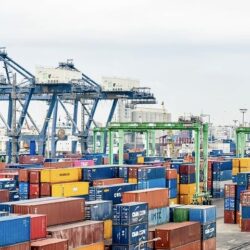DHL boss: “Supply chain recovery will take more time”

Tim Scharwath, CEO Freight at DHL Global Forwarding, expects some improvements in port congestion next year as new container ships are delivered and demand from shippers weakens now that the pandemic appears to be over. However, it won’t be enough to restore global supply chains flows to pre-COVID-19 levels: “It’s going to ease in 2023, but it’s not going to go back to 2019.”
Container lines ordered new ships during the pandemic as bottlenecks at ports pushed rates to historic highs and helped them to post record profits after years of losses. At the end of 2021, the global orderbook for container ships stood at 9.8% of the existing world fleet, about 6.5 percentage points higher than a year earlier, according to Bloomberg Intelligence, the research arm of the US TV network of the same name.
However, Scharwath does not expect to see a rapid return to the pre-COVID-19 overcapacity situation, where freight rates were very low. “The infrastructure, especially in the US, isn’t going to get better overnight, because infrastructure developments take a long time,” stated the chief executive in an interview with Bloomberg.
Port of Shanghai slowly reopening
Although the situation has improved in most places, supply chains could come under even more pressure due to Shanghai’s main port having been closed for two months. Now that it is tentatively reopening, work is underway to clear the cargo backlog. “The Shanghai situation was like a clog in a pipe,” said Scharwath. He added that the city was “smart to open up slowly to make sure that this clog goes out piece by piece and bit by bit to get the flow running.”
The reopening of this key Chinese manufacturing hub also comes at a time when more goods are being shipped from Asia to the US and Europe ahead of the year-end holidays, Scharwath stated.
Truckers on strike in South Korea
According to the National Retail Federation – the world’s largest retail trade association – US ports should prepare for a sharp increase in imports in the coming months, with the number of shipments expected to come close to the current record high dating from March (2.34 million 20-foot containers). Congestion is also likely to worsen at major European ports such as Rotterdam and Hamburg as more ships arrive from Asia, Scharwath added.
Moreover, he cautioned that the current strike by truckers in South Korea will put further pressure on supply chains. “Any stress you put on top of it, doesn’t matter where in the world, will have influence in other parts of the supply chain,” he claimed. “Five years ago, the Korea situation wouldn’t have had an impact. Now it does.”
Source: Bloomberg






